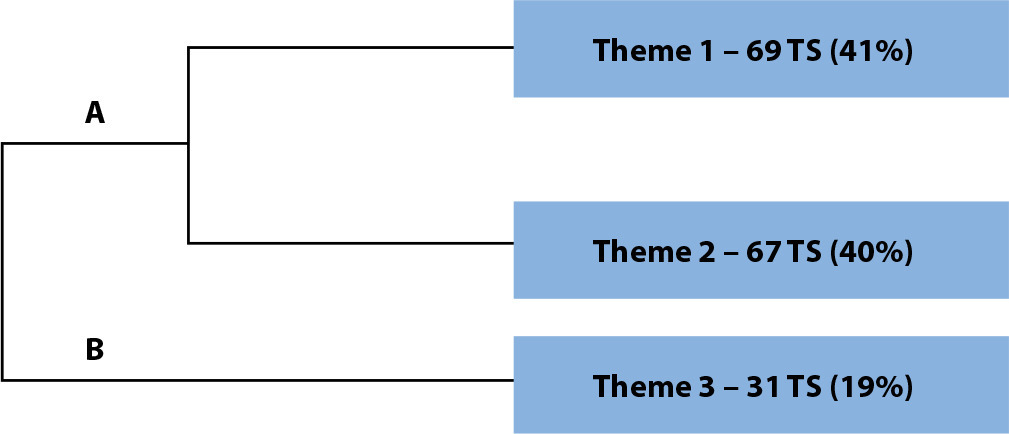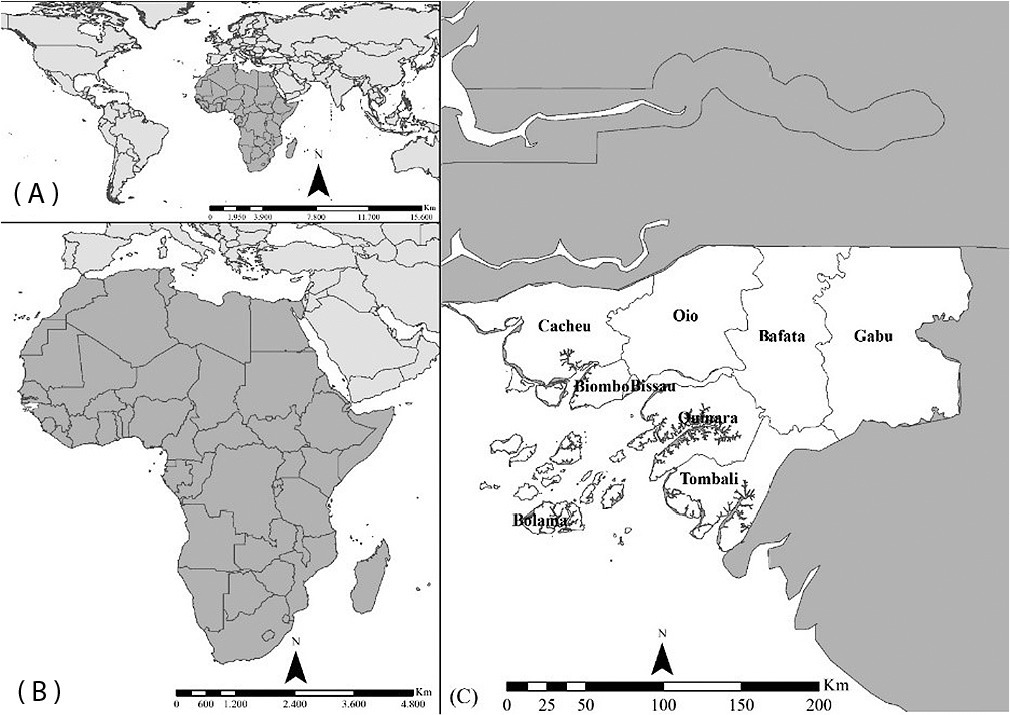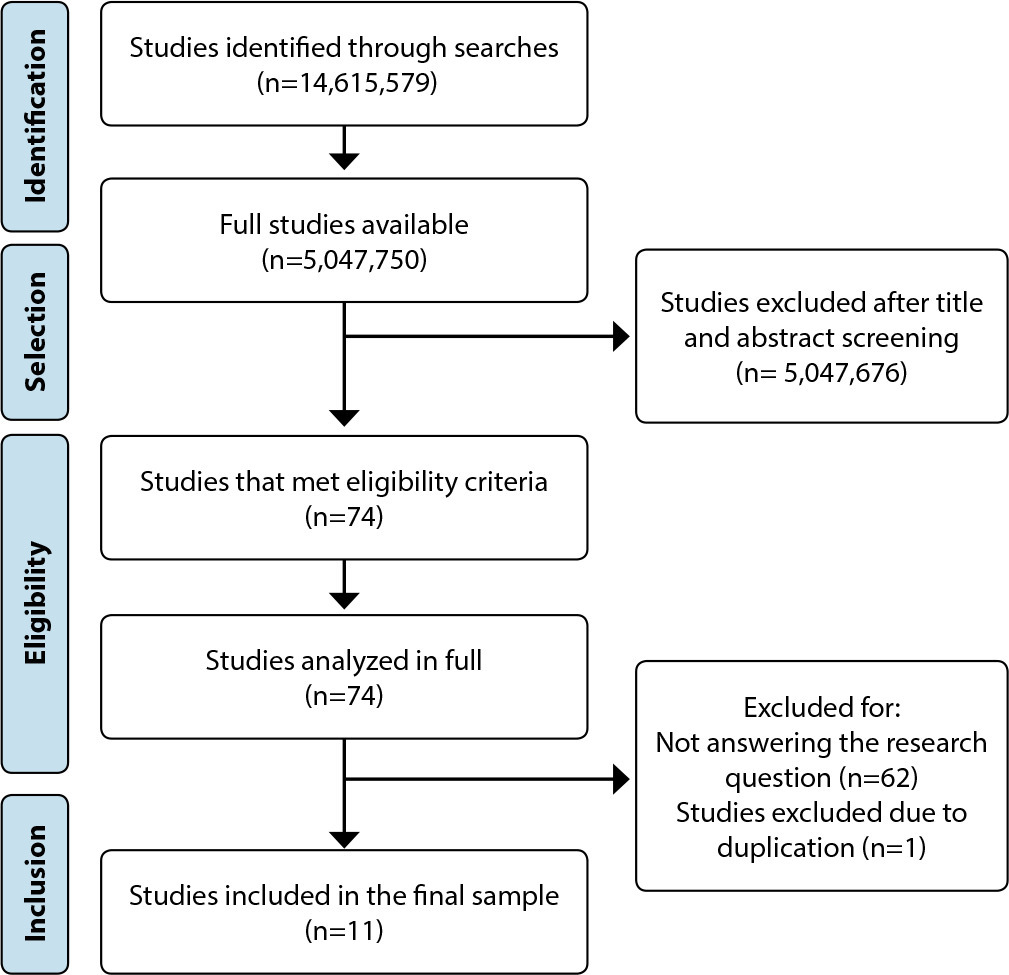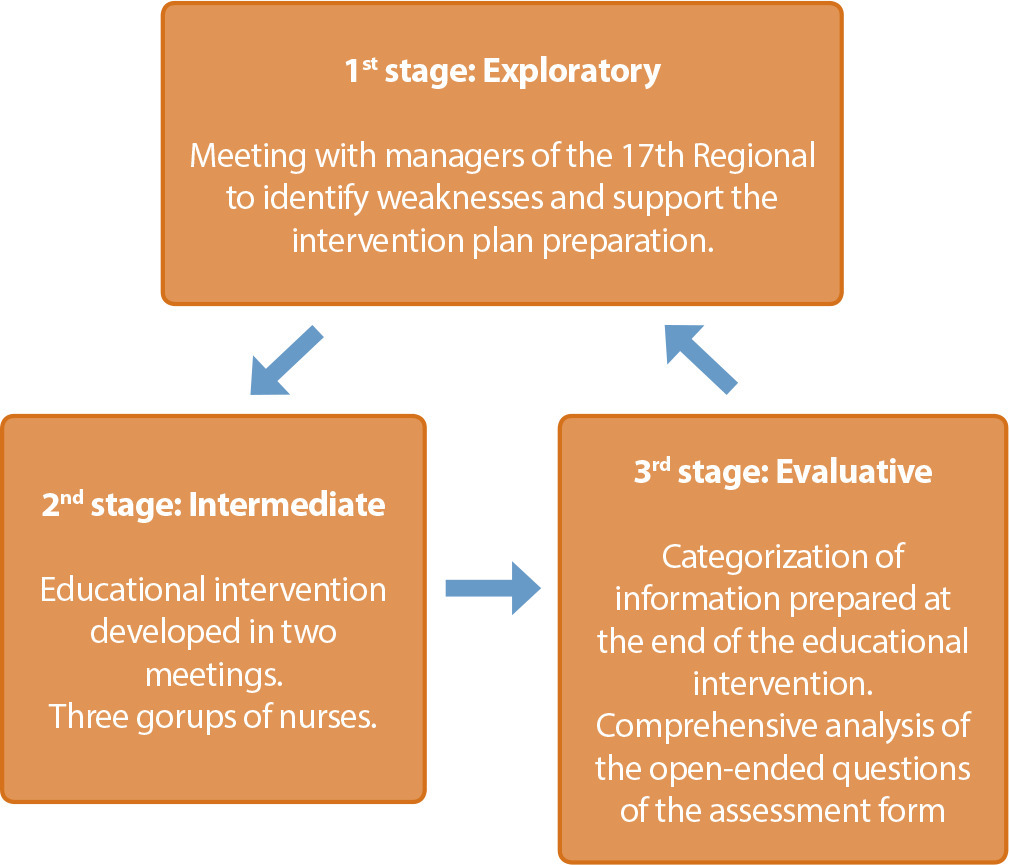-
ORIGINAL ARTICLE12-13-2024
Nurses’ experience regarding patient safety in mobile pre-hospital care
Revista Brasileira de Enfermagem. 2024;77(5):e20230529
Abstract
ORIGINAL ARTICLENurses’ experience regarding patient safety in mobile pre-hospital care
Revista Brasileira de Enfermagem. 2024;77(5):e20230529
DOI 10.1590/0034-7167-2023-0529
Views0See moreABSTRACT
Objectives:
to understand nurses’ experience regarding patient safety in mobile pre-hospital care.
Method:
a qualitative, exploratory and descriptive study, conducted with nurses active in mobile pre-hospital care services. Semi-structured interviews were conducted, audio-graved and submitted to Bardin’s content analysis.
Results:
from four thematic categories established, nurses reported the care and management skills necessary to work in this service. They demonstrated a commitment to ensuring safe care for patients, staff and spectators. They highlighted the actions taken to prevent and mitigate incidents. However, they based their experiences on practice protocols and individual actions, expressing the need to improve knowledge about patient safety.
Final Considerations:
mobile pre-hospital care nurses’ experience in relation to patient safety was limited, suggesting the need for training on the subject, alignment of work processes and implementation of strategies, aiming to guarantee safe care.
-
ORIGINAL ARTICLE12-13-2024
Repercussions of the pandemic on tuberculosis control actions from the perspective of health professionals
Revista Brasileira de Enfermagem. 2024;77(5):e20230477
Abstract
ORIGINAL ARTICLERepercussions of the pandemic on tuberculosis control actions from the perspective of health professionals
Revista Brasileira de Enfermagem. 2024;77(5):e20230477
DOI 10.1590/0034-7167-2023-0477
Views0See moreABSTRACT
Objectives:
to analyze the repercussions of the COVID-19 pandemic on tuberculosis control actions from the perspective of primary health care professionals.
Methods:
this descriptive study with a qualitative approach was conducted from November 2022 to April 2023, using semi-structured interviews with 11 key informant professionals from primary health care units in a Brazilian capital. Data were organized using Atlas.ti 22.0 software and subjected to thematic-categorical content analysis.
Results:
the pandemic scenario caused alterations in the work process, necessitating abrupt adaptations, and led to detrimental impacts on the health of professionals and tuberculosis control actions, which were reduced or discontinued.
Final Considerations:
there was evident unpreparedness and a lack of resources from various governmental levels and health services to handle the public health emergency situation without severe harm to the provision of essential services.
-
Training of Brazilian indigenous nurses: between human rights, valuing diversity and inclusion
Revista Brasileira de Enfermagem. 2024;77(5):e20230430
Abstract
Training of Brazilian indigenous nurses: between human rights, valuing diversity and inclusion
Revista Brasileira de Enfermagem. 2024;77(5):e20230430
DOI 10.1590/0034-7167-2023-0430
Views0See moreABSTRACT
Objectives:
to analyze the possibilities and potential of training indigenous nurses, given the Brazilian Health System (SUS), understanding the relationships between education and health.
Methods:
theoretical-reflective study, based on scientific literature, aligned with the experience, critical thinking of its authors and the Sustainable Development Goals in Brazil.
Results:
this text articulates three axes: Potential for including indigenous students in nursing training; Paths to achieving equity through inclusion and retention policies for indigenous students at different levels; and Implications of this for the SUS and global health.
Final Considerations:
indigenous students, beneficiaries of affirmative actions, face challenges of inclusion and retention in public universities that directly impact their academic training. Added to this are the difficulties identified in basic education, professor training and implementation of permanence policies, with consequences for services and training at other levels.
-
ORIGINAL ARTICLE12-13-2024
Interobserver agreement in Reception and Risk Stratification in Obstetrics implementation
Revista Brasileira de Enfermagem. 2024;77(5):e20230361
Abstract
ORIGINAL ARTICLEInterobserver agreement in Reception and Risk Stratification in Obstetrics implementation
Revista Brasileira de Enfermagem. 2024;77(5):e20230361
DOI 10.1590/0034-7167-2023-0361
Views0See moreABSTRACT
Objectives:
to analyze interobserver agreement in the Reception and Risk Stratification in Obstetrics protocol implementation.
Methods:
a cross-sectional study carried out during Reception and Risk Stratification in Obstetrics implementation, conducted in a tertiary hospital in southern Brazil with 891 participants in January 2020. Descriptive and interobserver agreement analysis was carried out using the Kappa coefficient in the risk stratification assigned by the triage nurse and reviewed by the researcher.
Results:
around half of the calls (55.6%) were stratified as not very urgent (green), followed by urgent (yellow) (31.8%), very urgent (orange) (9.3%), not urgent (blue) (3.4%) and no emerging stratification (red). Agreement analysis of revised stratification found Kappa values of 0.20 (blue), 0.54 (green), 0.77 (yellow) and 0.80 (orange).
Conclusions:
most appointments were non-urgent. The agreement analysis between the revised and assigned risk stratification revealed greater interobserver agreement as the priority level increased.
-
ORIGINAL ARTICLE12-13-2024
Adaptation and implementation of a Nursing care protocol for children in the Amazon Region
Revista Brasileira de Enfermagem. 2024;77(5):e20230245
Abstract
ORIGINAL ARTICLEAdaptation and implementation of a Nursing care protocol for children in the Amazon Region
Revista Brasileira de Enfermagem. 2024;77(5):e20230245
DOI 10.1590/0034-7167-2023-0245
Views0See moreABSTRACT
Objectives:
to describe the process of implementing an adapted protocol for pediatric nursing care in a health unit located in a municipality in the Amazon Region.
Methods:
methodological research conducted in a basic health unit with four family health teams in the state of Rondônia, involving seven nursing professionals. Data collection occurred between October 2020 and April 2022, following the research phases: situational diagnosis, exploratory phase, protocol definition, implementation, and evaluation.
Results:
the outcome was the adaptation and implementation of a nursing care protocol for children.
Final Considerations:
the adaptation and implementation process can be an effective approach to improving care, strengthening nursing as a profession with a solid foundation in scientific and clinical evidence. This facilitates early problem identification and appropriate guidance, leading to better health outcomes for children.
-
ORIGINAL ARTICLE12-13-2024
Nurses’ experiences in caring for people with mental health problems hospitalized due to clinical comorbidities
Revista Brasileira de Enfermagem. 2024;77(5):e20230136
Abstract
ORIGINAL ARTICLENurses’ experiences in caring for people with mental health problems hospitalized due to clinical comorbidities
Revista Brasileira de Enfermagem. 2024;77(5):e20230136
DOI 10.1590/0034-7167-2023-0136
Views0See moreABSTRACT
Objectives:
to understand nurses’ experiences in caring for people with mental health problems hospitalized due to clinical comorbidities in non-psychiatric Inpatient Units.
Methods:
qualitative study, guided by Alfred Schutz’s social phenomenology. Sixteen phenomenological interviews were conducted. The content was analyzed and discussed based on the literature, through the composition of three categories of analysis.
Results:
three categories emerged in the study: Challenges in care faced by nurses; Fragmented care action; and Ideal care. The disarticulation of the clinic was revealed, as described by nurses, showing care as an action far removed from the comprehensiveness of a person. Nurses’ performance is guided predominantly by biomedical reference, disregarding appreciation of subjectivity.
Final Considerations:
it was observed that nurses attribute the responsibility for patient care to factors external to their life-world, when, in fact, these aspects should be components that help them in comprehensive care construction.
-
REVIEW11-29-2024
Assessment of knowledge in oncology about care for transgender people: a scoping review
Revista Brasileira de Enfermagem. 2024;77:e20230532
Abstract
REVIEWAssessment of knowledge in oncology about care for transgender people: a scoping review
Revista Brasileira de Enfermagem. 2024;77:e20230532
DOI 10.1590/0034-7167-2023-0532
Views0ABSTRACT
Objective:
to identify evidence available in the literature on instruments and methodologies used to assess healthcare professionals’ knowledge about cancer care for the transgender population.
Methods:
a scoping review was conducted in seven databases, including studies that answered the question: what is the healthcare professionals’ level of knowledge about cancer care for the transgender population?
Results:
forty-one articles were selected that dealt specifically with healthcare professionals’knowledge in relation to care for the LGBTQIAPN+ population, especially the transgender population. Eighteen studies assessed patients’ perceptions of professionals’knowledge, whereas other studies used their own assessment tools, considering the global context of LGBTQIAPN+ health.
Conclusions:
there is no tested and validated instrument that assesses the knowledge about the transgender population’s oncological health, highlighting the need to construct and validate an instrument focused on this population’s needs.
Keywords:Health Services for Transgender PeopleNeoplasmsOncologyProfessional TrainingTransgender PeopleSee more
-
RESEARCH01-01-2016
Nurses’ managerial knowledge in the hospital setting
Revista Brasileira de Enfermagem. 2016;69(4):676-683
Abstract
RESEARCHNurses’ managerial knowledge in the hospital setting
Revista Brasileira de Enfermagem. 2016;69(4):676-683
DOI 10.1590/0034-7167.2016690409i
Views0See moreABSTRACT
Objective:
to analyze nurses’ managerial skills in the hospital setting, their perception of their own education and the relevance of training for their professional practice.
Method:
qualitative study based on the dialectical hermeneutics framework. Thirty-two nurses from three hospitals in the Brazilian state of Minas Gerais contributed to the study by taking part in six focus groups. Records were transcribed and three categories emerged from content analysis.
Results:
results evidenced the following managerial skills: supervision, leadership, decision making, planning and organization, as well as the relevance of education centers for their improvement and the continuing development of the nurses’ managerial skills.
Conclusion:
the authors believe this investigation will contribute for the improvement of nurses’ necessary managerial skills and also to identify gaps in this area of their education.
-
RESEARCH01-01-2016
Analysis of obstetric care provided by the Mobile Emergency Care Service
Revista Brasileira de Enfermagem. 2016;69(4):669-675
Abstract
RESEARCHAnalysis of obstetric care provided by the Mobile Emergency Care Service
Revista Brasileira de Enfermagem. 2016;69(4):669-675
DOI 10.1590/0034-7167.2016690408i
Views1ABSTRACT
Objective:
analyze the pertinence of calls made by obstetric users of the Mobile Emergency Care Service (SAMU 192) of Botucatu-SP.
Method:
retrospective and analytical research. All records of prehospital obstetric care delivered by the SAMU 192 in 2012 were analyzed. To be considered responsive, calls should lead to referral to a reference obstetric hospital or be classified with the colors red, orange and yellow, according to risk criteria defined by the Ministry of Health.
Results:
considering the two outcomes evaluated: referral to a reference hospital and risk criteria defined by the Ministry of Health, 6.7% and 75.6% of the calls were not pertinent, respectively. There was no matching between outcomes, neither variation between primiparas and multiparas as regards the call pertinence.
Conclusion:
this study ratifies the need for implementing a risk classification protocol in obstetrics, and support managers in the organization, qualification and effective implementation of the Rede Cegonha.
Keywords:Emergence Medical ServicesEmergency NursingObstetric NursingPregnant WomenPrehospital ServicesSee more -
RESEARCH01-01-2016
Experiences with severe maternal morbidity: a qualitative study on the perception of women
Revista Brasileira de Enfermagem. 2016;69(4):662-668
Abstract
RESEARCHExperiences with severe maternal morbidity: a qualitative study on the perception of women
Revista Brasileira de Enfermagem. 2016;69(4):662-668
DOI 10.1590/0034-7167.2016690407i
Views0See moreABSTRACT
Objective:
to know and analyze the experiences of women who developed an episode of Severe Maternal Morbidity.
Method:
this is a qualitative study, in which we interviewed 16 women admitted to a tertiary level hospital, as a result of this morbid state. We used content analysis in data processing.
Results:
two categories were identified: “Understanding maternal morbidity as a negative presence” and “Moving ahead: on constant alert”. The interviewees mentioned negative aspects, such as treatment difficulties and hospitalization, feelings of fear, concern for the fetus, frustration with the idealized pregnancy, trauma; and positive aspects, such as learning and the expression of the divine will in the experience of illness.
Conclusion:
effective care during the prenatal period, delivery and postpartum period should provide adequate support for the prevention and assistance in Severe Maternal Morbidity.
-
RESEARCH01-01-2016
Dialogue: network that intertwines the pedagogical relationship into the practical-reflective teaching
Revista Brasileira de Enfermagem. 2016;69(4):654-661
Abstract
RESEARCHDialogue: network that intertwines the pedagogical relationship into the practical-reflective teaching
Revista Brasileira de Enfermagem. 2016;69(4):654-661
DOI 10.1590/0034-7167.2016690406i
Views0See moreABSTRACT
Objective:
to understand how dialogue occurs in the pedagogical relation in the practical reflective teaching in an undergraduate program in nursing.
Method:
qualitative research, case study. Data collection was conducted from May 2013 to September 2014 with eight professors of Nursing, by means of observation and interviews. Data analysis followed the operational proposal constituted by the exploratory stage and the interpretive stage.
Results:
point the dialogue established within the pedagogical relation as a challenge to be faced in practical-reflective teaching, so professor and student build a relationship that foster thought and action in the theoretical context and in the field of practice.
Conclusion:
in establishing a dialogic-reflective tone in the pedagogical relationship, the professor opens paths to new discoveries, enabling the creation of teaching-learning spaces that stimulate autonomy, abilities, and critical and reflective attitudes of students along their education.
-
RESEARCH01-01-2016
Nursing care through the perception of hospitalized children
Revista Brasileira de Enfermagem. 2016;69(4):646-653
Abstract
RESEARCHNursing care through the perception of hospitalized children
Revista Brasileira de Enfermagem. 2016;69(4):646-653
DOI 10.1590/0034-7167.2016690405i
Views0See moreABSTRACT
Objective:
to describe the perception of hospitalized children of school age, on nursing care and understand what are, from their perspective, the best ways to address it to when performing such care.
Method:
qualitative, descriptive, exploratory research, with concepts of Vygotsky used as theoretical framework. The data collection occurred through interviews mediated by drawings and was performed with ten school children, with the interview later transcribed and submitted to a thematic analysis.
Results:
showed the importance of playing during hospitalization, of a friendly and caring approach and providing explanations regarding the performed procedures.
Conclusion:
nursing professionals need to consider how the children would like to receive the care being provided, so that their singularities are respected, characterizing nursing actions according to a perspective of the whole human being.
-
RESEARCH01-01-2016
Cost of dressings for prevention of sacral pressure ulcers
Revista Brasileira de Enfermagem. 2016;69(4):641-645
Abstract
RESEARCHCost of dressings for prevention of sacral pressure ulcers
Revista Brasileira de Enfermagem. 2016;69(4):641-645
DOI 10.1590/0034-7167.2016690404i
Views0See moreABSTRACT
Objective:
to identify costs of dressings to prevent sacral pressure ulcers in an adult intensive care unit in Paraná, Brazil.
Methods:
secondary analysis study with 25 patients admitted between October 2013 and March 2014, using transparent polyurethane film (n=15) or hydrocolloid dressing (n=10) on the sacral region. The cost of each intervention was based on the unit amount used in each type of dressing, and its purchase price (transparent film = R$15.80, hydrocolloid dressing = R$68.00).
Results:
the mean cost/patient was R$23.17 for use of transparent film and R$190.40 for use of hydrocolloid dressing. The main reason for changing the dressing was detachment.
Conclusion:
the transparent film was the most economically advantageous alternative to prevent sacral pressure ulcers in critical care patients. However, additional studies should be carried out including assessment of the effectiveness of both dressings.
-
RESEARCH01-01-2016
Health practices: the view of the black elderly population in a terreiro community
Revista Brasileira de Enfermagem. 2016;69(4):633-640
Abstract
RESEARCHHealth practices: the view of the black elderly population in a terreiro community
Revista Brasileira de Enfermagem. 2016;69(4):633-640
DOI 10.1590/0034-7167.2016690403i
Views1See moreABSTRACT
Objective:
to understand health practices of black, elderly people in a terreiro community (community of followers of traditional African-Brazilian religions).
Method:
qualitative descriptive study under the Black-African paradigm of civilization constituted by the Black-African cultural complex and the structuring elements of the African cosmovision. Semi-structured interviews were carried out from July to September 2013, with six black older people from a terreiro community in Porto Alegre, RS.
Results:
thematic content analysis resulted in the following categories: Ancestry; Belonging: the way to know and practice health; Health knowledge and practices in terreiro communities; and Complementarity: promoting health in the terreiro and traditional medicine and its respective subcategories.
Conclusion:
the study understood the importance of having a knowledge of the practices of African traditions in both the lifestyle and health of the older black population to help with nursing planning and interventions in response to their needs.
-
ORIGINAL ARTICLE10-09-2023
Construction and validation of a scenario for recognizing sepsis by nursing students: a methodological study
Revista Brasileira de Enfermagem. 2023;76(4):e20220537
Abstract
ORIGINAL ARTICLEConstruction and validation of a scenario for recognizing sepsis by nursing students: a methodological study
Revista Brasileira de Enfermagem. 2023;76(4):e20220537
DOI 10.1590/0034-7167-2022-0537
Views0See moreABSTRACT
Objective:
To build and validate a clinical simulation scenario for teaching Nursing students about early recognition of signs and symptoms of sepsis in the context of the emergency unit.
Methods:
Methodological study developed in two phases: construction of a simulated scenario and content validation by expert judges. For data analysis, the Content Validity Index (CVI) was calculated considering agreement equal to or greater than 80%. The minimum acceptable CVI value for scenario validation was 1.0.
Results:
The simulation scenario proved to be appropriate, with a global Content Validity Index equal to 1. Some adjustments related to the clarity of the wording were necessary, as suggested by the judges. Conclusions: A medium-complexity, high-fidelity scenario was successfully constructed and validated for teaching early recognition of sepsis signs and symptoms.
-
EXPERIENCE REPORT10-09-2023
Service organization protocol for coping with undergraduate students’ psychological distress: a collective construction
Revista Brasileira de Enfermagem. 2023;76(4):e20220535
Abstract
EXPERIENCE REPORTService organization protocol for coping with undergraduate students’ psychological distress: a collective construction
Revista Brasileira de Enfermagem. 2023;76(4):e20220535
DOI 10.1590/0034-7167-2022-0535
Views0See moreABSTRACT
Objective:
to report on the experience of the elaboration process of a service organization protocol for coping with public undergraduate students’ psychological distress in the countryside of São Paulo.
Method:
experience report on protocol production, an action research product, carried out according to the health care and service organization protocol model, made possible by remote meetings with 33 professionals linked to the management and services of the university’s health and social assistance departments.
Results:
collective protocol production provided an opportunity for an institutional agreement on educational, therapeutic and support actions, to be developed in groups or individually with students, with provision for permanent education with civil servants.
Final considerations:
this experience made it possible to list specific actions to face undergraduate students’ psychological distress, bringing health professionals closer to those in management, promoting the exchange of concepts and practices to re-signify and transform the work developed.
-
ORIGINAL ARTICLE10-09-2023
Performance of Family Health Strategy Nurses in LGBT+ Healthcare
Revista Brasileira de Enfermagem. 2023;76(4):e20220514
Abstract
ORIGINAL ARTICLEPerformance of Family Health Strategy Nurses in LGBT+ Healthcare
Revista Brasileira de Enfermagem. 2023;76(4):e20220514
DOI 10.1590/0034-7167-2022-0514
Views0See moreABSTRACT
Objective:
To analyze the role of Family Health Strategy (FHS) nurses in the health care of LGBT+ individuals.
Methods:
This qualitative study is based on Institutional Analysis. Data was collected in August 2021 through semi-structured interviews with 14 Family Health Strategy nurses from municipalities in the state of São Paulo. The data was processed using the IRaMuTeQ® software and analyzed lexically.
Results:
The textual corpus gave rise to three themes, which addressed the nurses’ practice, the difficulties and challenges they face in providing care to LGBT+ individuals, and the direct association of LGBT+ individuals with sexually transmitted infections.
Conclusion:
Lack of preparedness, access to information, and the need for expanded listening skills are still gaps in the performance of FHS nurses in caring for LGBT+ individuals. However, fostering acceptance and building strong relationships have been effective strategies in bridging the gap in nursing care for the LGBT+ community.

-
ORIGINAL ARTICLE10-09-2023
Perceived stress by mototaxi drivers and its relationship with sociodemographic and occupational characteristics
Revista Brasileira de Enfermagem. 2023;76(4):e20220505
Abstract
ORIGINAL ARTICLEPerceived stress by mototaxi drivers and its relationship with sociodemographic and occupational characteristics
Revista Brasileira de Enfermagem. 2023;76(4):e20220505
DOI 10.1590/0034-7167-2022-0505
Views0See moreABSTRACT
Objective:
To investigate the association of sociodemographic and occupational characteristics with a high level of perceived stress in motorcycle taxi drivers.
Method:
Cross-sectional study carried out with motorcycle taxi drivers who answered instruments on sociodemographic and occupational variables – Perceived Stress Scale, Job Content Questionnaire and Effort-Reward Imbalance. Descriptive statistics, Pearson’s chi-square test and Poisson regression with robust variance were used. Statistical significance was 5%.
Results:
Of the 800 motorcycle taxi drivers, 46.8% had a high level of perceived stress. In the multivariate analysis, a high level of stress was associated with low control over work (PR=7.76; 95%CI=5.19-11.61), low social support at work (PR=3.87; 95%CI =2.95 5.08), working hours longer than eight hours a day (RP=1.47; 95%CI=1.21-1.78) and monthly income less than or equal to two minimum wages (PR=1.34;95%CI=1.13-2.58).
Conclusion:
Long working hours, occupational stressors and low income were associated with a high level of perceived stress. Public policies and interventions to minimize occupational stressors are essential.
-
ORIGINAL ARTICLE10-09-2023
Spatial and temporal analysis of tuberculosis incidence in Guinea-Bissau, 2018 to 2020
Revista Brasileira de Enfermagem. 2023;76(4):e20220481
Abstract
ORIGINAL ARTICLESpatial and temporal analysis of tuberculosis incidence in Guinea-Bissau, 2018 to 2020
Revista Brasileira de Enfermagem. 2023;76(4):e20220481
DOI 10.1590/0034-7167-2022-0481
Views0See moreABSTRACT
Objective:
to analyze the epidemiological profile, spatial and temporal distribution of tuberculosis in Guinea-Bissau from 2018 to 2020.
Methods:
an ecological study, carried out in Guinea-Bissau, considering new cases of tuberculosis. Spatial analysis of areas was used to verify tuberculosis distribution in the country, and time series were used to identify incidence evolution over the years of study.
Results:
a total of 6,840 new cases of tuberculosis were reported. Tuberculosis incidence rate in the country ranged from 36.8 to 267.7 cases/100,000 inhabitants, with emphasis on the regions of Bissau and Biombo (over 90 cases/100,000). By using time series, it was possible to observe an increase in case incidence over the years of study.
Conclusions:
the study made it possible to identify the epidemiological profile of tuberculosis in Guinea-Bissau, spatial distribution heterogeneity, in addition to identifying the disease evolution over the years of investigation.

-
ORIGINAL ARTICLE10-09-2023
Eating habits: what foods do children between 12 and 36 months consume?
Revista Brasileira de Enfermagem. 2023;76(4):e20220393
Abstract
ORIGINAL ARTICLEEating habits: what foods do children between 12 and 36 months consume?
Revista Brasileira de Enfermagem. 2023;76(4):e20220393
DOI 10.1590/0034-7167-2022-0393
Views0See moreABSTRACT
Objective:
to identify toddlers’ eating habits.
Method:
a cross-sectional study of quantitative analysis, with a sample of 808 toddlers who attended day care centers in the district of Viseu, Portugal, between November 2018 and September 2019. Data were collected using a questionnaire directed at parents.
Results:
the prevalence of children who ate six meals a day was 42.8%, and 42.5%, those who ate five meals. It was found that 2.0% of children consumed chocolates, 1.0%, desserts, and 0.4%, carbonated beverages, daily. On average, dairy product (M=5.61; SD=2.62) and meat/fish/egg (M=4.80; SD=3.57) consumption was higher than recommended, while fat (M=0.48; SD=0.40), legume (M=0.49; SD=0.45), vegetable (M=1.18; SD=0.87) and water (M=0 .51; SD=0.29) consumption was lower.
Conclusions:
there was a higher or lower consumption than recommended for some foods, highlighting the need to implement nursing intervention programs aimed at promoting healthy eating habits in toddlers and families.
-
REVIEW10-09-2023
Self-care guidelines for patients in the post-hematopoietic stem cell transplantation period: a scoping review
Revista Brasileira de Enfermagem. 2023;76(4):e20220383
Abstract
REVIEWSelf-care guidelines for patients in the post-hematopoietic stem cell transplantation period: a scoping review
Revista Brasileira de Enfermagem. 2023;76(4):e20220383
DOI 10.1590/0034-7167-2022-0383
Views0ABSTRACT
Objective:
To map the evidence on self-care guidelines for patients in the post-hematopoietic stem cell transplantation (HSCT) period.
Method:
Scoping review supported by Joanna Briggs Institute recommendations, with searches conducted between March and April 2022 in national and international databases and repositories of theses and dissertations.
Results:
Of the 11 studies that composed the final sample, the guidelines had a social and personal aspect, as post-transplant patients need to follow numerous essential recommendations for the prevention of infections and complications for successful treatment and improved quality of life.
Conclusion:
Knowing the self-care guidelines that must be performed by post-HSCT patients is fundamental for the nursing team to provide the necessary information for care outside the controlled environment of the hospital, in addition to minimizing episodes of infection, death, and increasing the survival and quality of life of transplant recipients.
Keywords:Health EducationHematopoietic Stem Cell TransplantationNursing CarePatient Discharge SummariesSelf-CareSee more
Search
Search in:
Nuvem de Tags
Aged (144) Atenção Primária à Saúde (239) COVID-19 (104) Cuidados de Enfermagem (269) Educação em Enfermagem (151) Educação em Saúde (139) Enfermagem (930) Estudos de Validação (131) Health Education (144) Idoso (208) Mental Health (149) Nursing (987) Nursing Care (306) Patient Safety (151) Primary Health Care (284) Qualidade de Vida (104) Quality of Life (106) Saúde Mental (145) Segurança do Paciente (150) Validation Studies (108)





